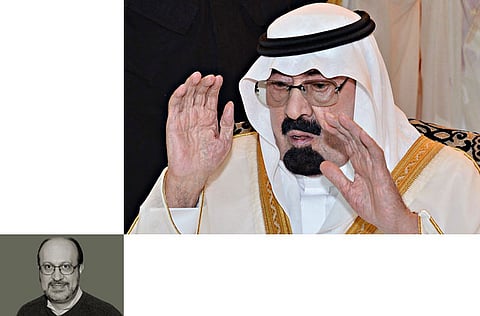Riyadh throws down the gauntlet
No one was allowed to engage in violent activities

Writing in the Daily Beast, Leslie H. Gelb, a former New York Times columnist, president of the Council on Foreign Relations and senior US government official, opined that it was “Time to hold our nose and back Egypt’s military” because, he asserted, “if Islamists regain[ed] control in Egypt, all hope for democracy [would be] lost”.
Pragmatic, Gelb reflected western elite perceptions, which were, regrettably, unprincipled. Although the violence that enveloped Egypt was unbecoming, the Muslim Brotherhood proved that it never aspired for democratisation, lofty rhetoric aside. In turn, Washington leaders turned into contortionists as they urged General Abdul Fattah Al Sissi to curb attacks against armed hooligans, hesitating to cut off military aid to Cairo. Although few observers noted it, the wavering fulfilled US commitments under the 1979 Camp David quid pro quo that, truth be told, was far more important than the fate of those who perished.
If some vacillated, King Abdullah Bin Abdul Aziz did not, but once again rose to the occasion when he made it clear that Riyadh unequivocally opposed extremism throughout the Arab World. “Let it be known to those who interfered in Egypt’s internal affairs that they themselves are fanning the fire of sedition and are promoting the terrorism which they call for fighting,” declared the Saudi monarch. The pronouncement revealed his utter frustration with western powers anxious to support the paths to democratisation, without differentiating between genuine voices that sought freedom and those who pretended to.
“Let the entire world know that the people and government of the Kingdom of Saudi Arabia stood and still stand today with our brothers in Egypt against terrorism, extremism and sedition and against whomever is trying to interfere in Egypt’s internal affairs,” said the King.
The choice of words was telling and worth repeating — “against terrorism, extremism and sedition” — that did not skirt the issue or hide behind platitudes to please pro-Muslim Brotherhood constituents. In fact, this proclamation was also a warning to those who contemplated similar actions on the Arabian Peninsula to weaken or even attempt to overthrow the conservative Arab Gulf monarchs, as Riyadh channelled significant resources to address local grievances. Importantly, the Custodian of the Two Holy Mosques was praised by the US Secretary of State, John Kerry, less than a fortnight ago for the $100 million (Dh367.8 million) donation to the UN Centre on Counterterrorism, which demonstrated the “Kingdom’s commitment to supporting multilateral institutions and strengthening international cooperation on counterterrorism”.
Still, allocating funds to such institutions was not the Saudi ruler’s sole objective, for he at least understood what was at stake. In the Egyptian case, the Saudi leader was crystal clear: Those who failed to perceive extremist activities were, perhaps unwittingly, promoting sedition and even terrorism. One simply could not claim to oppose and fan extremist tendencies simultaneously.
Equally important was Riyadh’s commitments to Cairo especially after utterly confused European officials threatened to end their meagre financial assistance programmes. Foreign Minister Prince Saud Al Faisal pledged in Paris to fill any financial gaps left by western countries withdrawing aid from Egypt. “To those who have declared they are stopping aid to Egypt or are waving such a threat, the Arab and Muslim nations are wealthy with their people and resources and will not shy away from offering a helping hand to Egypt,” he declared. Earlier, Saudi Arabia, Kuwait and the UAE had pledged $12 billion in aid to Egypt.
Prince Al Waleed Bin Talal rose to the occasion too. Via Twitter and a news release, the prominent royal announced that Tareq Al Suwaidan, a leader of the Kuwaiti Muslim Brotherhood as well as the general manager of one of his television stations, was dismissed. Simply stated, it did not make sense to provide a forum to those who spewed their hatred against others, assuming that their divinely inspired righteousness was infallible.
Although relations between Saudi Arabia and Egypt were checkered, the two influential Sunni countries competed for a leadership role, even if they complemented each other far better than most realised. In the aftermath of the January 25, 2011, Egyptian Revolution, Cairo’s aura diminished, as non-Arab outsiders like Turkey and Iran strove to fill the alleged leadership gap. At first, Riyadh adopted restrained positions, though it reversed its outlook and moved to correct putative foreign political intrusions into Arab affairs. It rejected both Ankara’s and Tehran’s Islamically oriented governments, even if Saudi Arabia supported the Turkish business-friendly regime and maintained relatively correct ties with Iran. In general, all Arab leaders felt alienated by the support that Turkey and Iran extended to the Muslim Brotherhood, concluding that they could not possibly allow regional Islamist movements additional gains, lest the ruling dynasties and, more important, the largely pro-monarchic populations, be threatened with violence.
What Abdullah Bin Abdul Aziz did was to clearly and unequivocally delineate what was acceptable and what was not. Even if Muslim Brotherhood sympathisers existed throughout the Arab World, the Saudi monarch ended the theoretical quarrel that gripped religious and intellectual circles for nearly a century, calling for an end to any and all expressions of support to seditious and extremist activities. While one was free to hold any belief, even to “hold one’s nose”, as Gelb recommended, no one was allowed to engage in violent activities. Beyond shallow understandings or even delusional views, the Saudi King affirmed once again, that gradual reforms were the only tolerated methods.
Dr Joseph A. Kechichian is an author, most recently of Legal and Political Reforms in Saudi Arabia, London: Routledge, 2013.


